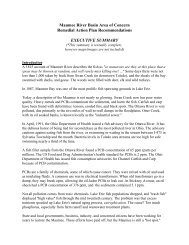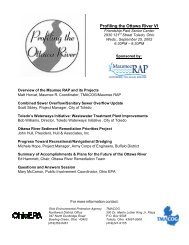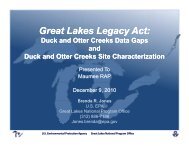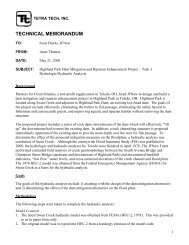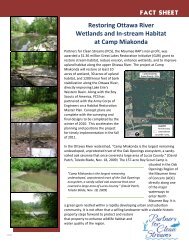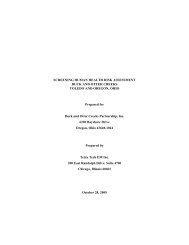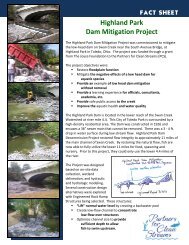Complete report - Partners for Clean Streams
Complete report - Partners for Clean Streams
Complete report - Partners for Clean Streams
Create successful ePaper yourself
Turn your PDF publications into a flip-book with our unique Google optimized e-Paper software.
Issue 4 - Urban Runoff<br />
Correction & Prevention<br />
Health Department Regulations<br />
Ongoing<br />
Description:<br />
Health Departments prohibit illicit connections and identify/investigate illicit<br />
connections during site visits.<br />
NPDES Phase I<br />
1990<br />
Description:<br />
NPDES MS4 Storm Water Permit<br />
US EPA promulgated NPDES Phase I regulations in 1990. Under these regulations all<br />
medium and large (over 100,000 population served by separate storm sewers) MS4s<br />
were required to obtain NPDES permit coverage <strong>for</strong> their storm water discharges.<br />
The City of Toledo was the only municipality in the Maumee AOC required to comply<br />
under Phase I. Toledo’s MS4 NPDES permit became effective on September 1, 1997.<br />
After the permit became effective Toledo was required to: update and exercise legal<br />
authority to control discharges to and from their storm sewers (within 6 mos.); prohibit<br />
non-storm water discharges (on-going); eliminate illicit connections and advise<br />
responsible party to contact OEPA (ongoing); inventory major MS4 outfalls (within 24<br />
mos); establish and/or modify dry weather screening methodology to detect presence<br />
of illicit connections (6 mos); educate City residents on storm water pollution and the<br />
use, storage, recycling, and disposal of household hazardous materials (on-going); to<br />
publicize the telephone number <strong>for</strong> public <strong>report</strong>ing of illicit connections and improper<br />
disposal into the MS4 (on-going); to cooperate with other entities in education <strong>for</strong><br />
construction site operators (on-going); to train city personnel on identification and<br />
<strong>report</strong>ing of illicit discharges and improper disposal activities (annually); to consider<br />
water quality impacts of flood control projects (within 12 months); submit an outline of<br />
plans <strong>for</strong> practicable and economically feasible retro-fits (within 36 mos.); to store deicing<br />
materials under cover or in a diked or contained manner; to conduct annual<br />
employee training on de-icing practices; to develop and implement pollution<br />
prevention techniques <strong>for</strong> pesticide use (within 8 mos.)<br />
General NPDES <strong>for</strong> Storm Water Associated with Construction Activity<br />
Starting in 1992 construction sites that are part of a larger total common plan of<br />
development or sale which will result in the disturbance of 5 or more acres are<br />
required to obtain coverage under Ohio EPA’s General NPDES permit <strong>for</strong> Storm<br />
Water Discharges Associated with Construction Activity. Projects owned/operated by<br />
a public entity with a service population under 100,000 were excluded from this<br />
requirement by the 1991 Transportation Act. The main focus of the General NPDES<br />
Construction Permit is sediment and erosion controls, but it also addresses other<br />
sources of storm water pollution associated with the active phase of construction.<br />
Approximately 568 permitted sites throughout Lucas (328), Ottawa (26), Wood (179),<br />
and Fulton (35) Counties are currently (October 2001) covered by this permit. Since<br />
1994, over 2200 inspections have been per<strong>for</strong>med by Ohio EPA Staff throughout the<br />
Northwest District. Toledo’s MS4 NPDES permit required the City to adopt sediment<br />
control criteria <strong>for</strong> sites that are 1- 5 acres (within 24 mos.), and cooperate with Ohio<br />
Activities and Accomplishments<br />
in the Maumee Area of Concern<br />
144<br />
Issue 4: Urban Runoff



